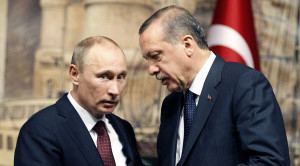A
While NATO used Turkey to ‘defend’ Europe’s so-called southern flank (by threatening Russia’s southern flank), the European Union led Turkey on for decades with respect to joining it. Of late, Europe has asked Turkey to rescue it from the dire consequences of US-led wars against Muslim countries that impelled hundreds of thousands of refugees toward its shores. In a supreme irony, having excluded Muslim Turkey from the Christian club, it found itself hosting many more Muslim refugees than the entire population of Turkey.
Turkey did not behave well in this matter, but currently, it may be helping to change the geo-strategic balance across the Eurasian continent. It occupies a key geographic position between Europe and Asia, and at the end of World War II, threw in its lot with the Euro-Atlantic alliance by joining NATO, enrolling its large, well-trained army in the stand-off with the Soviet Union. This policy was consistent with centuries of generally inimical, often warlike relations between the Muslim Ottoman Empire and the Eastern Orthodox Tsarist Empire. Yet sixty-five years of fealty to the West did not move by an iota the standoff between Islam and Christianity.
Whether it be the attempt by the US to bring about ‘regime change’ in Syria, or Europe’s continued rejection of Turkey for obvious religious reasons (delaying granting visa-free travel to Turkish citizens in exchange for Turkey processing refugee applications to Europe), appears to have dove-tailed with two other crucial international developments: the US build-up of accusations against Russia, with a view to forcing it into war, and President Putin’s increasing cooperation with China via the Shanghai Cooperation Agreement, the Eurasian Economic Community and the Silk Road Project also known as One- Belt, One Road, that will link Europe to Asia by rail and road.
Although individual events such as the downing of a Russian fighter jet by Turkey as part of opposing policies on the Syrian civil war, severely marred relations between the two countries, it would appear that Turkey’s erratic president has realized it is now more advantageous for his country to acknowledge its Eastern roots than to try to graft itself onto the foreign religious culture represented by the West. Besides the obvious economic advantages of joining a community that would stretch from the Bosphorus to the Pacific, both Turkey and Russia consider religion to be a preeminent factor in governance, an allegiance that, in today’s international context, is as important as military might.
Deena Stryker is an international expert, author and journalist that has been at the forefront of international politics for over thirty years, exlusively for the online journal “New Eastern Outlook.
